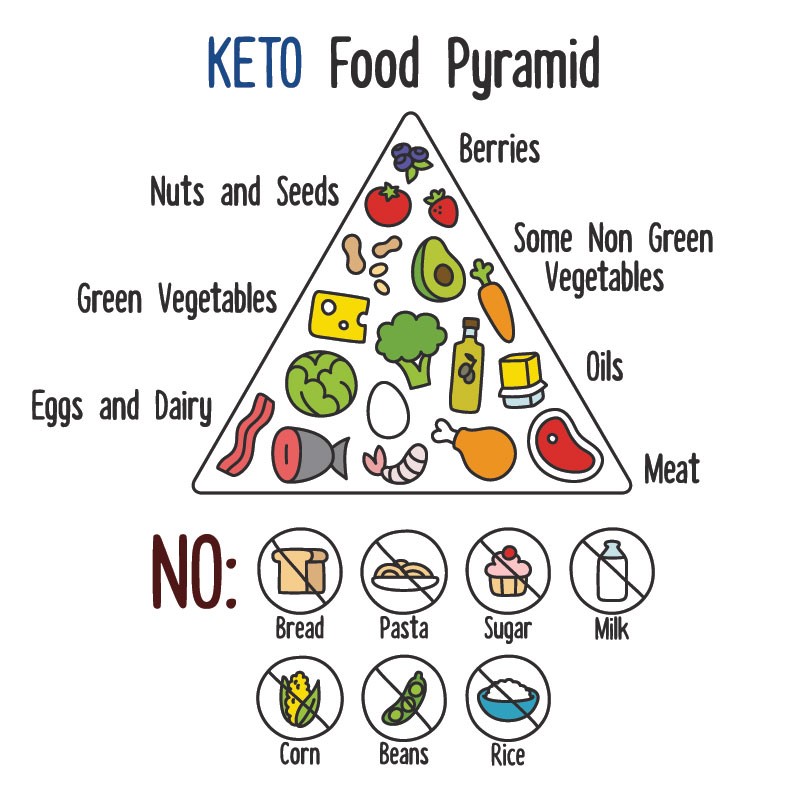Have you ever wondered if there’s a way to improve your health and lose weight while managing your diabetes? Well, there just might be a solution for you – the keto diet! Have you heard of it before? In this article, we’ll delve into the benefits of a keto diet specifically for individuals with diabetes. You’ll learn how this diet can potentially help you maintain stable blood sugar levels, lose weight, and improve your overall health. So, let’s dive in and discover how a custom keto diet plan might just be the answer you’ve been looking for!
Keto Diet for Diabetic Individuals
The keto diet, short for the ketogenic diet, is a low-carb, high-fat diet that has gained popularity in recent years. It involves drastically reducing your carbohydrate intake and replacing it with healthy fats. This change in macronutrient composition puts your body into a state called ketosis, where it primarily burns fat for fuel instead of glucose derived from carbohydrates. For individuals with diabetes, this shift in metabolism can be particularly beneficial. By limiting your intake of carbohydrates, you can potentially improve your blood sugar control and reduce the need for insulin or other diabetes medications. Additionally, the keto diet has been shown to promote weight loss, which is often a goal for many people with diabetes. In our upcoming article, we’ll explore the science behind these benefits in more detail and discuss how you can customize a keto diet plan to suit your unique needs. So, stay tuned and get ready to embark on a journey towards better health!

Get Your Custom Keto Diet Plan
What is a Keto Diet?
Definition of a Keto Diet
A keto diet, short for ketogenic diet, is a low-carb, high-fat diet that has gained popularity in recent years for its potential health benefits. The main goal of a keto diet is to induce a state of ketosis in the body, where it becomes more efficient at burning fat for energy instead of relying on glucose from carbohydrates.
Basic principles of a Keto Diet
The basic principles of a keto diet involve drastically reducing carbohydrate intake and increasing fat consumption. Typically, a keto diet consists of around 70-75% fat, 20-25% protein, and just 5-10% carbohydrates. By limiting carb intake, your body is forced to use fat as its primary source of energy, leading to weight loss and other potential health improvements.
Role of ketosis in a Keto Diet
Ketosis is the metabolic state that occurs when your body starts burning fat for fuel instead of glucose. This occurs when carbohydrate intake is severely restricted, and the body begins to break down stored fat for energy production. Ketones are produced as a byproduct of this process, and they become the main fuel source for the body and brain during ketosis.
Understanding Diabetes
Definition of Diabetes
Diabetes is a chronic medical condition characterized by high blood sugar levels. It occurs when the body either doesn’t produce enough insulin or can’t effectively use the insulin it produces. Insulin is a hormone that regulates blood sugar levels and helps convert glucose into energy for the body’s cells.
Types of Diabetes
There are several types of diabetes, including type 1, type 2, and gestational diabetes. Type 1 diabetes is an autoimmune disease where the body’s immune system mistakenly attacks and destroys the insulin-producing cells in the pancreas. Type 2 diabetes is the most common type and often develops due to lifestyle factors such as poor diet, lack of physical activity, and obesity. Gestational diabetes occurs during pregnancy and usually resolves after childbirth.
Impact of Diabetes on health
Diabetes can have a significant impact on overall health if not properly managed. High blood sugar levels over time can cause damage to various organs and systems in the body, including the eyes, kidneys, nerves, and cardiovascular system. Individuals with diabetes are also at an increased risk of developing other health conditions, such as heart disease, stroke, and neuropathy.
Get Your Custom Keto Diet Plan
Link Between Keto Diet and Diabetes
Effectiveness of a Keto Diet for Diabetic Individuals
Research has shown that a keto diet can be effective for individuals with diabetes. By restricting carbohydrate intake, a keto diet helps control blood sugar levels and reduces the need for insulin. It can be particularly beneficial for individuals with type 2 diabetes, as it can improve insulin sensitivity and promote weight loss.
Benefits of a Keto Diet for Diabetic Individuals
There are several potential benefits of a keto diet for diabetic individuals. Firstly, it can lead to significant weight loss, which is crucial for managing type 2 diabetes. Excess weight puts additional strain on the body and can worsen insulin resistance. By losing weight on a keto diet, individuals can improve their blood sugar control and reduce the risk of diabetes-related complications.
Secondly, a keto diet helps regulate blood sugar levels by minimizing carbohydrate intake. Since carbohydrates are the primary source of glucose, reducing their consumption can prevent blood sugar spikes and the need for excessive insulin. This can lead to better glycemic control and reduce the risk of hypoglycemia in diabetic individuals.
Furthermore, a keto diet may improve cholesterol levels and reduce cardiovascular risk factors commonly associated with diabetes. Studies have shown that a keto diet can increase HDL (good) cholesterol, decrease LDL (bad) cholesterol, and lower triglyceride levels. This, in turn, can reduce the risk of heart disease and stroke in individuals with diabetes.
Considerations for Diabetic Individuals on a Keto Diet
While a keto diet can be beneficial for diabetic individuals, it’s important to approach it with caution. Before starting a keto diet, it’s crucial to consult with a healthcare professional who can provide guidance and monitor your progress. They can advise on any necessary adjustments to your medication or insulin regimen to ensure optimal blood sugar control.
Individualized meal planning is also essential for diabetic individuals on a keto diet. It’s crucial to focus on nutrient-dense, low-carb foods that provide a balance of macronutrients and essential vitamins and minerals. Monitoring blood sugar levels regularly and making adjustments to your diet as needed is key to maintaining stable glucose levels.
Additionally, it’s important to adapt the diet to specific needs and preferences. Some individuals may find it challenging to adhere to a strict keto diet long-term, and it’s okay to make modifications to ensure sustainability. Gradual transitions and incorporating occasional higher-carb meals may be necessary for some individuals to prevent potential nutrient deficiencies and maintain a healthy relationship with food.
Weight Management and Diabetes
Relationship between weight and diabetes
Weight management is crucial for individuals with diabetes, especially those with type 2 diabetes. Excess weight can exacerbate insulin resistance and make blood sugar control more challenging. Losing weight through a keto diet can significantly improve insulin sensitivity and glycemic control in diabetic individuals.
How a Keto Diet can aid weight loss in diabetes
A keto diet aids weight loss through various mechanisms. Firstly, the reduction in carbohydrate intake leads to a decrease in insulin levels. Lower insulin levels promote fat burning and inhibit fat storage, making it easier to shed excess pounds. Secondly, the higher fat and protein content in a keto diet promotes satiety, reducing hunger cravings and helping individuals stick to their calorie goals.
Impact of weight loss on diabetes management
Weight loss has a positive impact on diabetes management by improving insulin sensitivity and glycemic control. As individuals lose weight, their body becomes more efficient at using insulin, which leads to better blood sugar regulation. Weight loss can also reduce the risk of developing other obesity-related complications, such as heart disease and high blood pressure.

Get Your Custom Keto Diet Plan
Blood Sugar Control and Insulin Sensitivity
Effect of a Keto Diet on blood sugar levels
A keto diet can have a significant impact on blood sugar levels by minimizing carbohydrate intake. When carb intake is reduced, the body produces less glucose, which means there is less sugar in the bloodstream. As a result, blood sugar levels become more stable, reducing the need for excessive insulin production.
Improvement in insulin sensitivity through a Keto Diet
Insulin sensitivity refers to how responsive the body’s cells are to insulin. In individuals with diabetes, insulin sensitivity is often impaired, leading to difficulties in blood sugar regulation. A keto diet can improve insulin sensitivity by reducing insulin resistance and promoting efficient glucose uptake by the cells.
Reduced dependency on insulin in diabetic individuals
One of the potential benefits of a keto diet for diabetic individuals is the reduced dependency on insulin. By minimizing carbohydrate intake and achieving stable blood sugar levels, some individuals may be able to decrease their insulin dosage or even eliminate the need for insulin altogether. However, it’s important to note that any changes in medication should be done under medical supervision.
Reducing Inflammation and Risk Factors
Role of inflammation in diabetes
Inflammation is a key factor in the development and progression of diabetes. Chronic low-grade inflammation is commonly observed in individuals with diabetes and is associated with insulin resistance and other diabetes-related complications. Managing inflammation is crucial for optimal diabetes management.
Anti-inflammatory effects of a Keto Diet
A keto diet has been found to have anti-inflammatory effects, which can be beneficial for diabetic individuals. The high intake of healthy fats, such as omega-3 fatty acids, found in foods like fatty fish and nuts, can help reduce inflammation in the body. This, in turn, can improve insulin sensitivity and overall glycemic control.
Potential reduction in diabetes-related risk factors
Following a keto diet may also lead to a reduction in diabetes-related risk factors. For example, the diet’s ability to promote weight loss, improve cholesterol levels, and lower blood pressure may contribute to a decreased risk of heart disease and other cardiovascular complications associated with diabetes. By addressing these risk factors, individuals can potentially improve their overall health outcomes.
Managing Cholesterol and Heart Health
Impact of a Keto Diet on cholesterol levels
Contrary to popular belief, a keto diet can actually help improve cholesterol levels in diabetic individuals. Studies have shown that a keto diet can increase levels of HDL (good) cholesterol while reducing levels of LDL (bad) cholesterol and triglycerides. This shift in cholesterol profile can lower the risk of heart disease and improve overall heart health.
Improvement in heart health for diabetic individuals
Heart disease is a significant concern for individuals with diabetes, as they are at a higher risk of developing cardiovascular complications. A keto diet’s positive impact on cholesterol levels, blood pressure, and weight loss can lead to improved heart health outcomes in individuals with diabetes.
Reduced risk of cardiovascular complications
By following a keto diet and improving cholesterol levels and overall heart health, diabetic individuals may reduce their risk of developing cardiovascular complications. This includes conditions such as coronary artery disease, stroke, and peripheral artery disease. The reduction in cardiovascular risk factors is especially important for individuals with diabetes, who are already at a higher risk of these conditions.
Improving Energy and Mental Clarity
Enhanced energy levels on a Keto Diet
Many individuals report improved energy levels when following a keto diet. This can be attributed to the switch from utilizing glucose as the primary fuel source to burning fat for energy. Since fat is a more efficient and sustainable energy source, individuals often experience increased stamina and improved physical performance.
Clearer thinking and improved cognitive function
In addition to enhanced energy levels, a keto diet may also benefit mental clarity and cognitive function. Ketones, the byproduct of fat metabolism, can provide a more stable and efficient source of energy for the brain. This can result in improved focus, concentration, and mental performance.
Management of fatigue and brain fog
Diabetic individuals often experience fatigue and brain fog due to fluctuating blood sugar levels. Following a keto diet can help stabilize blood sugar levels, reducing energy crashes and the accompanying symptoms. By providing a more consistent and sustainable source of energy, a keto diet may alleviate fatigue and improve overall cognitive function.

Considerations and Precautions
Consulting a healthcare professional
Before starting a keto diet, it is crucial to consult with a healthcare professional, especially if you have diabetes or any other underlying medical conditions. They can provide personalized guidance, monitor your progress, and make any necessary adjustments to your medication or insulin regimen.
Individualized meal planning and monitoring
Individualized meal planning is essential when following a keto diet, especially for diabetic individuals. It’s important to work with a registered dietitian or nutritionist who can create a meal plan tailored to your specific needs and preferences. Regular monitoring of blood sugar levels is also critical to ensure stable glycemic control while on a keto diet.
Adapting the diet to specific needs and preferences
While a keto diet can be beneficial for diabetic individuals, it’s essential to adapt it to your specific needs and preferences. Not everyone may be able to strictly adhere to a keto diet long-term, and that’s okay. Making modifications to the diet to ensure sustainability and prevent nutrient deficiencies is crucial. Gradual transitions and incorporating occasional higher-carb meals may be necessary for some individuals.
Conclusion
In conclusion, a keto diet can offer numerous benefits for diabetic individuals. By following a low-carb, high-fat diet, individuals can achieve better blood sugar control, improve insulin sensitivity, and promote weight loss. A keto diet may also help reduce inflammation, improve cholesterol and heart health, and enhance energy levels and cognitive function. However, it’s important to approach a keto diet under medical supervision, with individualized meal planning and monitoring. By exploring the potential benefits of a keto diet, individuals with diabetes can improve their overall health outcomes and lead a healthier life.



